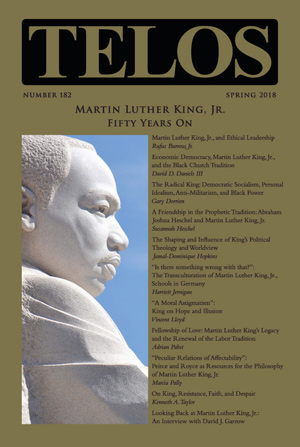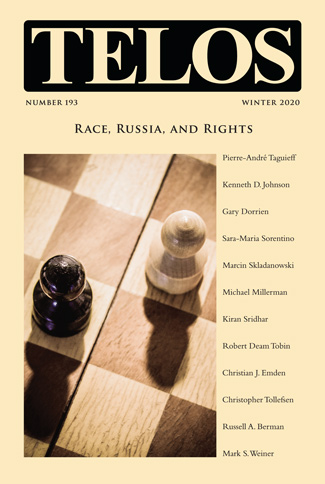By Telos Press · Tuesday, February 16, 2021 In today’s episode of the Telos Press Podcast, Camelia Raghinaru talks with Russell A. Berman about his article “Reflections on Rights,” one of a group of essays from Telos 192 (Fall 2020) on the U.S. State Department’s Commission on Unalienable Rights. An excerpt of the article appears here. If your university has an online subscription to Telos, you can read the full article at the Telos Online website. For non-subscribers, learn how your university can begin a subscription to Telos at our library recommendation page. Purchase a print copy of Telos 192 in our online store.
Listen to the podcast here.
Continue reading →
By Telos Press · Monday, January 18, 2021 Save 30% on Telos 182 (Spring 2018): Martin Luther King, Jr.: Fifty Years On, a special issue dedicated to King’s life and thought, in our store. Offer expires 1/24/21.
 In commemoration of the life and legacy of Martin Luther King, Jr., today’s episode of the Telos Press Podcast features a wide-ranging interview with Kenneth D. Johnson by Telos editor David Pan. Their discussion covers a variety of topics, including the influence of King on the Black Lives Matter movement, the different approaches to political activism and civil disobedience, the call to defund the police, the nature and effects of systemic racism, the role of education in expanding opportunities for the Black community, the role of government in addressing social and economic inequalities, and the question of how a universal basic income might help alleviate these problems. In commemoration of the life and legacy of Martin Luther King, Jr., today’s episode of the Telos Press Podcast features a wide-ranging interview with Kenneth D. Johnson by Telos editor David Pan. Their discussion covers a variety of topics, including the influence of King on the Black Lives Matter movement, the different approaches to political activism and civil disobedience, the call to defund the police, the nature and effects of systemic racism, the role of education in expanding opportunities for the Black community, the role of government in addressing social and economic inequalities, and the question of how a universal basic income might help alleviate these problems.
In addition to being a member of Telos‘s editorial board, Ken Johnson edited Telos 182 (Spring 2018): Martin Luther King, Jr.: Fifty Years On, a special issue dedicated to King’s life and thought. We are now offering a 30% discount on Telos 182 when you purchase your copy in our store. With ten in-depth articles on King’s intellectual and political legacy, as well as an interview with King scholar David Garrow, Telos 182 is a must-read for anyone interested in understanding how Martin Luther King Jr. continues to influence us today. Read the introduction to Telos 182 here.
Listen to the podcast here.
Continue reading →
By David Pan · Friday, December 18, 2020 Telos 193 (Winter 2020): Race, Russia, and Rights is now available for purchase in our store. Individual subscriptions to Telos are also available in both print and online formats.
 What is not up for discussion? The answer to this question defines a political order, and the repressiveness of such an order will depend on where this boundary is set between the discussable and the undiscussable. But it is not as if more discussion necessarily means less repression. Certain topics—genocide, torture, slavery—definitely need to be off the table as legitimate political measures. Other topics—the choosing of rulers and historical facts—need to be discussable in order to avoid tyranny. In between lies a gray area whose definition will establish the character of each political order. Conversely, a lack of consensus on this issue will lead to political instability that goes beyond the content of political debates, indicating that the question of discussability coincides with the problem of political identity. This issue of Telos will consider three areas in which discussability has become the main issue, leading to implacable conflict. What is not up for discussion? The answer to this question defines a political order, and the repressiveness of such an order will depend on where this boundary is set between the discussable and the undiscussable. But it is not as if more discussion necessarily means less repression. Certain topics—genocide, torture, slavery—definitely need to be off the table as legitimate political measures. Other topics—the choosing of rulers and historical facts—need to be discussable in order to avoid tyranny. In between lies a gray area whose definition will establish the character of each political order. Conversely, a lack of consensus on this issue will lead to political instability that goes beyond the content of political debates, indicating that the question of discussability coincides with the problem of political identity. This issue of Telos will consider three areas in which discussability has become the main issue, leading to implacable conflict.
Continue reading →
By Arnold Vaatz · Tuesday, August 18, 2020 The following essay originally appeared in German at Tichys Einblick. Translated by Russell A. Berman, who has written a separate note on the topic here.
At the outset I want to make clear that I view the stipulations of the governments for containing the corona pandemic as appropriate and that it is necessary to obey them.
Yet this is not the central issue. Instead, the central issue is that the BLM demonstration against racism was widely praised and tolerated, while the demonstration of August 1 [against corona restrictions—trans.] was widely condemned, despite posing identical dangers.
The most valuable good for a government is its credibility. One does not need it in a dictatorship, as long as the arguments come from the barrel of a gun. In a democracy, however, credibility is one of the foundational conditions for domestic peace.
Continue reading →
|
|









